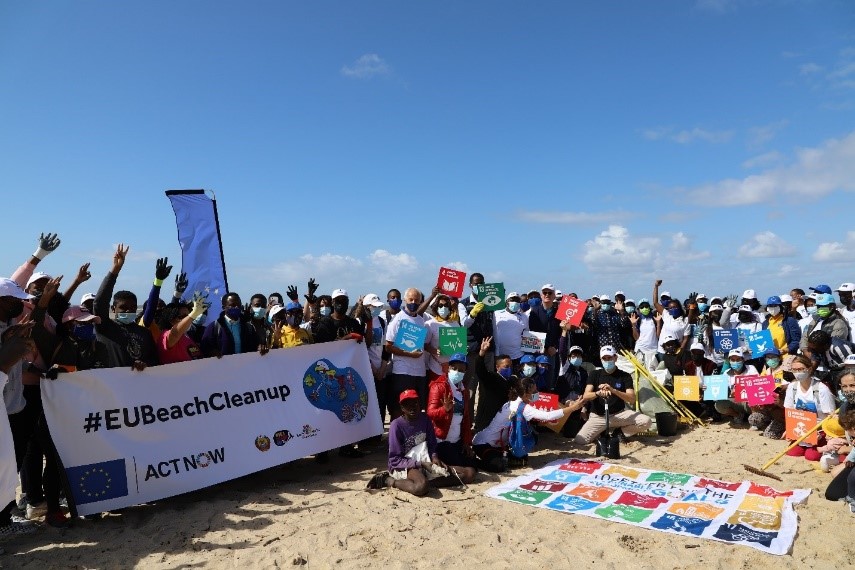Increasing the resilience of Mozambique’s health system to adverse climate change impacts
Mozambique is one of the most vulnerable countries in the world to the impacts of climate change. It lies in the Intertropical Convergence Zone, a narrow belt of humidity and precipitation expected to unevenly shift and affect water availability, food production, and disease distribution. Mozambique’s high disease burden is dominated by climate-sensitive diseases, such as malaria, cholera, and measles, which disproportionally affect rural populations, women, and children. Essential public services, including health, water, and sanitation, are especially stretched in rural areas and along Mozambique’s extensive coastline, locations characterized by widespread poverty and vulnerability to extreme, climate-related weather events such as cyclones, droughts, and floods. In 2022, Mozambique was classified as very high risk (ranked 9 out of 191 countries globally) in the Index for Risk Management (INFORM Risk Index), a global open-source risk assessment for humanitarian crises and disasters which support decisions about prevention, preparedness and response.
To increase the resilience of Mozambique’s health system to climate change impacts, a project was launched in 2018 that aimed to strengthen on-the-ground interventions and policy-level actions. Four years later, the Ministry of Health’s capacity to monitor climate change risks and impacts and coordinate and lead health adaptation efforts has been strengthened. During the 26th United Nations Climate Change Conference of the Parties (COP 26), Mozambique submitted an Update of the First Nationally Determined Contribution to the United Nations Framework Convention on Climate Change (2020-2025), committing to strengthening the national health system to climate change impacts through taking measures to protect public health.

How did Mozambique do it, and how did the WHO Secretariat support Mozambique?
- Taking a strategic approach to bring together climate change and health agendas – WHO technical experts developed strategic plans to mainstream climate in the health sector, covering the costs of multistakeholder workshops. This enabled the Ministry of Health to collaborate with other sectors and communities. The 2020-2021 WHO-Mozambique Binary Work Plan, countersigned by the Government of Mozambique, and the Ministry of Health’s 2022-2025 National Health Adaption Plan to Climate Change, which integrated technical inputs from WHO and multistakeholder groups, depart from a disease-specific approach in favor of an integrated approach to improving health outcomes.
- Building awareness and advocating for change – To pave the way for implementation of integrated programming for climate change and health during 2020-2021, government decision-makers, representatives in diverse sectors (environment, meteorology, and agriculture), donors, United Nations agencies and non-governmental organizations were urged to address climate risks across health policies, strategies, plans and programmes.
- Building monitoring capacity - Early Warning, Alert, and Response System (EWARS) activities were conducted at Mozambique’s Health Observatory (National Health Institute) and seven pilot sentinel sites: WHO established a National Climate Change and Health Technical Working Group with the Ministry of Health, research institutes, and universities then coordinated monthly with two universities in Europe to risk map and model climate-sensitive diseases. To integrate climate data into health surveillance systems and incorporate climate service decision aides into health program decision-making, WHO provided trainings to the Ministry of Health, the National Institute of Health, and over 85 staff at the provincial and district levels. WHO developed dashboards and risk mapping tools, and provided one desktop, nine laptops, and 32 iPad tablets to enable the triangulation of entomological and epidemiological data with climate information such as temperature and humidity.
 Photo Credit: © WHO Mozambique/Joelma Pereira/ 2021
Photo Credit: © WHO Mozambique/Joelma Pereira/ 2021
Photo Caption: EU/United Nation Beach Cleanup Campaign, 18 September 2021. WHO collaborated to strengthen its partnership for environmental determinates of health including climate change
WHO built capacity within the Ministry of Health which will continue to provide benefits in health decision-making and programming beyond the lifespan of the project and will contribute to key country development priorities and multiple Sustainable Development Goals. Learnings from the work conducted have been disseminated globally through conferences and workshops, including the National Adaptation Plan-Global Support Programme’s South-South Knowledge Exchange Forum.
[1] https://climhealthafrica.org/news-mozambique-vulnerability-and-adaptation-assessment
Photo Credit: © WHO Mozambique/Joelma, P
Photo Caption: European Union/United Nations Beach Cleanup Campaign, 18 September 2021. WHO collaborated to strengthen its partnership for environmental determinants of health, including climate change.
